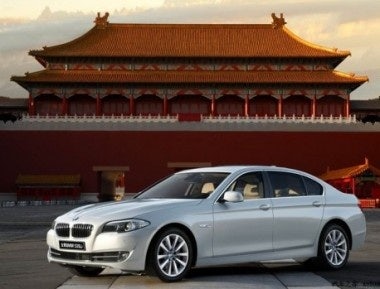Sales Stay Strong, But Signals Indicate Slowdown For Automakers#

German automakers have come to rely on China as a source of reliable growth, but that may change in coming years
One of the more interesting sides of the Chinese luxury market has always been the auto sector, a segment long dominated by German automakers like Audi, Mercedes-Benz and BMW. But despite strong sales in the first three quarters of 2011, signals are starting to indicate that the roaring growth that major high-end automakers have recorded in China over the past decade is set to decelerate. As theFinancial Times writes this week, luxury automakers may soon hit a rough patch in the critical China market as competition from other brands becomes fiercer, consumers become more educated, and Beijing tightens regulation of so-called "shadow lending."
From the FT:
“The fight for market share in China will see Mercedes face competition from a larger range of luxury carmakers,” [says Namrita Chow of IHS Automotive in Shanghai], adding that “wealthy Chinese consumers are also more aware of different luxury brands and are becoming more daring in their purchases”.
Mike Dunne, author of American Wheels, Chinese Roads: The Story of General Motors in China, has an even more exotic take on the current slowdown in Chinese car sales. He thinks that last year’s 32 per cent overall market growth was fuelled in large part by buyers borrowing from so-called “shadow lenders”, outside the banking system.
Borrowing from the underground lending system does not show up in the figures for the percentage of cars purchased with finance – because those who borrow from loan sharks show up clutching wads of cash. But it is real nonetheless, he says. Now Beijing is cracking down on shadow lending, “That’s why demand has gone soft” in the China car market, he writes in his latest column in Automotive News China.
If these observers prove correct, and fewer customers show up at dealerships with wads of cash procured from shadow lenders, we could see automakers have to work harder to maintain the sales figures to which they've become accustomed in China in recent years. However, this isn't limited only to the auto market. We're seeing similar trends hitting other segments of the luxury market in China, specifically fashion and accessories. Whereas logo-based high-end brands like Louis Vuitton or Gucci could recently rely on the loyalty of Chinese consumers, they're now finding a greater proportion of these shoppers becoming more savvy, worldly and discriminating.
Ultimately, whether it's in the auto market or the luxury market, this should work out in the favor of Chinese consumers, as brands try harder to gain (and, more importantly, maintain) their loyalty.